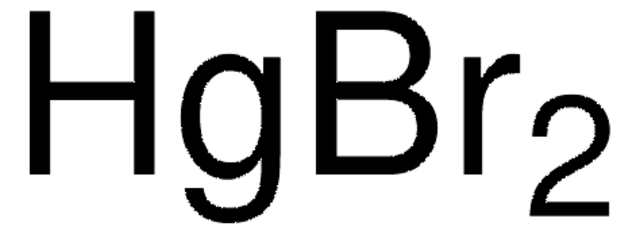1.04421
Mercury(II) bromide
for analysis EMSURE® ACS,Reag. Ph Eur
Synonym(s):
Mercury(II) bromide
About This Item
Recommended Products
grade
ACS reagent
Quality Level
Agency
reag. Ph. Eur.
vapor pressure
3.0 hPa ( 150 °C)
product line
EMSURE®
Assay
≥99.0% (complexometric)
form
solid
potency
40 mg/kg LD50, oral (Rat)
100 mg/kg LD50, skin (Rabbit)
impurities
≤0.05% Insoluble matter (in methanol)
reduction residue
≤0.02%
pH
4.5 (20 °C, 5 g/L in H2O)
bp
322 °C/1013 hPa (sublimed)
mp
237 °C
density
6.1 g/cm3 at 25 °C
bulk density
1450 kg/m3
anion traces
chloride (Cl-): ≤0.25%
storage temp.
2-30°C
InChI
1S/2BrH.Hg/h2*1H;/q;;+2/p-2
InChI key
NGYIMTKLQULBOO-UHFFFAOYSA-L
Application
- Influence of halogen bonding interaction on supramolecular assembly of coordination compounds; head-to-tail N···X synthon repetitivity: This study explores the role of halogen bonds in the structural organization of coordination compounds, offering insights into potential applications in molecular engineering and design. The findings could inform chemists about novel strategies for constructing complex molecular architectures using Mercury(II) bromide as a halogen bonding agent (Khavasi HR, Azhdari Tehrani A, 2013).
Analysis Note
Insoluble matter (in methanol): ≤ 0.05 %
Chloride (Cl): ≤ 0.25 %
Residue after reduction: ≤ 0.02 %
Correspons to ACS,Reag. Ph Eur
Legal Information
Signal Word
Danger
Hazard Statements
Precautionary Statements
Hazard Classifications
Acute Tox. 1 Dermal - Acute Tox. 1 Inhalation - Acute Tox. 2 Oral - Aquatic Acute 1 - Aquatic Chronic 1 - STOT RE 2
Storage Class Code
6.1B - Non-combustible, acute toxic Cat. 1 and 2 / very toxic hazardous materials
WGK
WGK 3
Flash Point(F)
Not applicable
Flash Point(C)
Not applicable
Regulatory Listings
Regulatory Listings are mainly provided for chemical products. Only limited information can be provided here for non-chemical products. No entry means none of the components are listed. It is the user’s obligation to ensure the safe and legal use of the product.
EU REACH Annex XVII (Restriction List)
Certificates of Analysis (COA)
Search for Certificates of Analysis (COA) by entering the products Lot/Batch Number. Lot and Batch Numbers can be found on a product’s label following the words ‘Lot’ or ‘Batch’.
Already Own This Product?
Find documentation for the products that you have recently purchased in the Document Library.
Our team of scientists has experience in all areas of research including Life Science, Material Science, Chemical Synthesis, Chromatography, Analytical and many others.
Contact Technical Service










